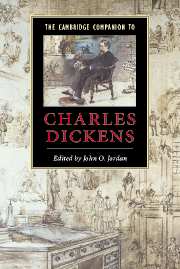Book contents
- Frontmatter
- Preface
- 1 The life and times of Charles Dickens
- 2 From Sketches to Nickleby
- 3 The middle novels
- 4 Moments of decision in Bleak House
- 5 Novels of the 1850s
- 6 The late novels
- 7 Fictions of childhood
- 8 Fictions of the city
- 9 Gender, family, and domestic ideology
- 10 Dickens and language
- 11 Dickens and the form of the novel
- 12 Dickens and illustration
- 13 Dickens and theatre
- 14 Dickens and film
- Selected bibliography
- Index
- Series list
9 - Gender, family, and domestic ideology
Published online by Cambridge University Press: 28 May 2006
- Frontmatter
- Preface
- 1 The life and times of Charles Dickens
- 2 From Sketches to Nickleby
- 3 The middle novels
- 4 Moments of decision in Bleak House
- 5 Novels of the 1850s
- 6 The late novels
- 7 Fictions of childhood
- 8 Fictions of the city
- 9 Gender, family, and domestic ideology
- 10 Dickens and language
- 11 Dickens and the form of the novel
- 12 Dickens and illustration
- 13 Dickens and theatre
- 14 Dickens and film
- Selected bibliography
- Index
- Series list
Summary
“- Be it ever,” added Mr. Wegg in prose as he glanced about [Mr. Venus's] shop, “ever so ghastly, all things considered there’s no place like it.”
Our Mutual Friend 3.7As the editorial manifesto he wrote in 1850 to accompany the first number of Household Words indicates, Dickens had always aspired “to live in the Household affections, and to be numbered among the Household thoughts” of his readers. He saw himself as a prophet of the hearth, and his contemporaries hailed his reputation as the purveyor of cozy domestic bliss. As a reviewer of David Copperfield in Fraser’s Magazine wrote, “There is not a fireside in the kingdom where the cunning fellow has not contrived to secure a corner for himself as one of the dearest, and, by this time, one of the oldest friends of the family.” This reviewer attributes Dickens’s widespread popularity to “his deep reverence for the household sanctities, his enthusiastic worship of the household gods.” Yet despite this reputation as the prophet of domestic bliss, any close examination of Dickens’s novels reveals very few portraits of happy and harmonious families. According to George Newlin, a statistical analysis of the novels yields 149 full orphans, 82 with no father, and 87 with no mother, making a total of 318 full or partial orphans: “only fifteen named characters we deem significant in the major works (novels and Christmas Books) had or have two parents, and in nearly half of these cases their families today would be considered dysfunctional.”
- Type
- Chapter
- Information
- The Cambridge Companion to Charles Dickens , pp. 120 - 135Publisher: Cambridge University PressPrint publication year: 2001
- 1
- Cited by



